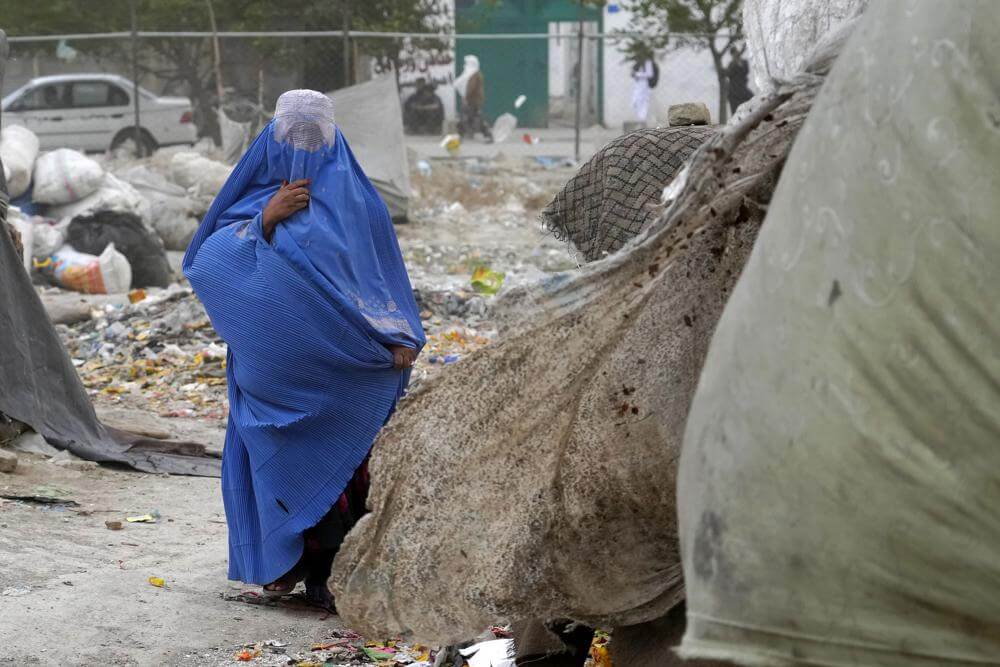Signalling a return to its previous hardline rule, the Taliban issued a decree on Saturday ordering all Afghan women to cover their faces from head to toe in public spaces, the latest in a series of discriminatory new laws it has imposed since seizing power in August last year. In fact, the latest decree comes just days after the group promised “good news” that “will make everyone happy” regarding the current ban on girls attending high school.
The decree, issued by the Taliban’s Ministry for the Propagation of Virtue and the Prevention of Vice, has set elaborate rules on how women should dress in public. The new law states that any garment, not too tight nor too thin, that covers the entire body of a woman is considered a hijab and is permissible.
However, it added that the burqa, which covers the eyes as well, is the best form of the hijab “as it is part of Afghan culture and it has been used for ages.” It also advised women to stay at home because “the best way to observe hijab is to not go out unless it’s necessary.”
Full interview with the spokesman of the Taliban's Ministry for the Prevention of Vice and Promotion of Virtue @SadiqAkif on the decree ordering women to wear face veils:
— Secunder Kermani (@SecKermani) May 8, 2022
w / @MalikMudassir2 @Shoaib65686187 pic.twitter.com/mckYYIoT4a
Ministry spokesperson Akif Mujahir told the BBC that the decree is based on the Quran and hence the covering the face is “compulsory.” “This is not only the order of the Islamic Emirate [of Afghanistan] but the order of god,” he declared.
Saying that 99% of women in Afghanistan want to cover their faces, Mujahir proclaimed, “The hijab is not a deprivation, but a crown of dignity and respect for our sisters.”
The decree was also approved by the group’s Supreme Leader, Haibatullah Akhundzada, who said that women who are not very young or very old must cover their faces, except for their eyes, in public, especially “whenever they see or meet an unrelated man.” Failing to do so, he noted, a Taliban representative would visit the woman’s father or closest male relative and potentially imprison them or fire them from state jobs.
According to several reports, many women in Afghanistan have begun defying the Taliban’s decree. A 24-year-old woman told the New York Times that she will refuse to adhere to the decree even if the Taliban kills her. “Women are born free. It is their basic human right to walk around freely,” she said.
I'm alarmed by today's announcement by the Taliban that women must cover their faces in public and leave home only in cases of necessity.
— António Guterres (@antonioguterres) May 8, 2022
I once again urge the Taliban to keep their promises to Afghan women & girls, and their obligations under international human rights law.
United Nations (UN) Secretary-General António Guterres said that he is “alarmed” by the Taliban’s announcement. “I once again urge the Taliban to keep their promises to Afghan women and girls, and their obligations under international human rights law,” he added.
Similarly, the UN Assistance Mission in Afghanistan (UNAMA) stated on Saturday that it is “deeply concerned” with the decree. “This decision contradicts numerous assurances regarding respect for and protection of all Afghans’ human rights, including those of women and girls, that had been provided to the international community by Taliban,” UNAMA said.
Step by step Taliban is obliterating Afghan women’s #humanrights with the latest edict on mandatory face coverings compounding restrictions on education, movement, employment and public life. There must be consequences for human rights violations - time for the int comm to act. https://t.co/6MFgT0R0Uw
— UN Special Rapporteur Richard Bennett (@SR_Afghanistan) May 8, 2022
Noting that the Taliban’s decision “might further strain engagement with the international community,” UNAMA said that it “will immediately request meetings with the Taliban de facto authorities to seek clarification on the status of this decision.”
The decision comes just days after the Taliban said that it would announce “good news” on girls’ education following a ban on girls from attending high school in March. Senior Taliban official Anas Haqqani said last week that an assembly of clerics will soon be held to solve the problem related to girls’ education.
In March, the Taliban said that it will not allow girls to attend high school after promising the opposite since coming to power. It said that allowing girls above the sixth grade to attend high school goes against Islamic Sharia law.
In Afghanistan, the Taliban have announced yet more repressive measures against women. A new decree calls on women not to leave their homes if possible and demands all women cover their faces in public.
— Andrew Stroehlein (@astroehlein) May 9, 2022
An extreme misogynist thugocracy. https://t.co/J4aHwfpe3b pic.twitter.com/9nm8G2YMzG
One of the Taliban’s key promises following its seizure of power on August 15 was to allow girls to attend schools. The group had promised that girls will continue to have access to education and that the leadership would make sure that all of its fighters abide by this policy.
Since coming to power, the Taliban has taken several steps to drastically reduce women’s rights and freedom, particularly with regard to education, employment, travel, and dress code. The latest move puts the group at odds with the international community, which has been urging the Taliban to take measures to protect minorities, women, and children as a precondition for any recognition of its government and relaxation of sanctions.

